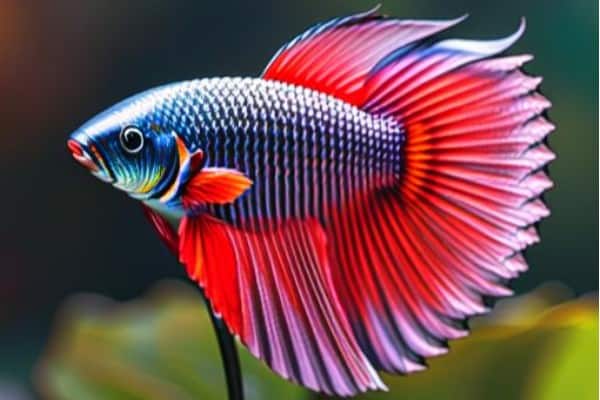Bettas, also known as Siamese fighting fish, are a popular freshwater aquarium fish native to Southeast Asia. These colorful fish are known for their flowing fins and aggressive territorial behaviors.
Regarding feeding bettas, they have a reputation for being gluttonous, eager eaters. Overfeeding is a common problem for betta keepers.
However, bettas can go extended periods without eating due to a unique adaptation called the labyrinth organ. This allows them to breathe air directly from the surface, conserving energy.
While bettas are hardy when it comes to fasting compared to other aquarium fish, there are limits to how long they can go without eating.
Knowing the signs of hunger, the potential risks of fasting, and how to encourage eating are important for betta keepers. Proper nutrition is vital to keeping bettas active, healthy, and long-lived.
Betta Fish Biology
Betta fish, also known as Siamese fighting fish, is a freshwater fish native to Southeast Asia’s rice paddies and slow-moving streams.
In the wild, bettas are carnivores that feed on insects and insect larvae, small crustaceans like daphnia or brine shrimp, and other aquatic invertebrates.
Bettas have a relatively small stomach, approximately the size of their eye. This means they prefer to eat small amounts of food frequently rather than large meals less often.
In nature, they are constantly foraging for bugs and nibbling on whatever prey they can find swimming by.
Their natural diet consists of high-protein live foods naturally rich in nutrients. This carnivorous diet has led to bettas evolving short digestive tracts and lacking the ability to efficiently digest and derive nutrition from plant matter.
Their digestive system is optimized for meaty live foods.
How Often Bettas Need to Eat
Bettas are predatory fish that, in the wild, eat insects and other small invertebrates. As pets, we want to mimic their natural diet and feeding habits as much as possible.
The general recommendation is to feed adult bettas once or twice daily. Younger, growing juvenile bettas may need to be fed twice or thrice daily.
Bettas have small stomachs, so they prefer smaller, frequent meals rather than one large meal. This helps prevent digestive issues and boredom from lack of activity.
Give them as much food as they can consume when feeding your betta within 2-3 minutes. Uneaten food left sitting in the tank can degrade water quality. It’s better to underfeed than overfeed slightly.
You’ll quickly learn your individual betta’s appetite and can adjust portion sizes accordingly. Pay attention to their body shape and watch for signs of over- or under-feeding.
With proper portions at regular feedings, adult bettas should be content with one or two daily meals. Adjust as needed based on appetite, age, and activity levels.
Signs of Hunger
Bettas exhibit some clear signs when hungry and need to be fed. Attention to these signs can help you determine if your betta is adequately nourished.
- Increased activity/begging – Hungry bettas will become more active and energetic, swimming around excitedly when they see you approaching or when it’s feeding time. They may even swim up to the tank’s surface and “beg” for food as you come near. This is one of the most obvious signs of hunger in bettas.
- Loss of color – Bettas’ bright, vibrant colors indicate their health. When a betta is very hungry and underfed, you may notice their coloration starting to fade and look dull or pale. Nutritional deficiencies cause this loss of vibrancy in color over time.
- Weight loss – Underfed bettas may begin to lose weight, taking on a thinner, skinnier appearance. Their body profile will appear narrower when viewed top-down, and their abdomen will look sunken in from the side. Monitoring your betta’s body shape and watching for weight fluctuations is important.
Attention to these physical hunger cues will allow you to recognize when your betta needs more frequent feedings or more significant portions.
Acting quickly when you spot the signs of hunger will help keep your betta healthy, active, and colorful.
How Long Can Bettas Go Without Eating?
Healthy adult bettas can usually survive without food for 2-3 weeks. However, just because they can does not mean they should.
Bettas use a tremendous amount of energy swimming, and going for such long periods without food can cause serious health complications.
Younger juvenile bettas cannot go as long without eating as adult bettas. If a juvenile betta goes more than 5-7 days without food, it is cause for concern.
The precise amount of time a betta can go without food depends on various factors:
- Temperature – Bettas in warmer water metabolize food faster than those in cooler temperatures. In warmer environments, they may only be able to go 1-2 weeks without food before facing malnutrition.
- Health—A betta weakened by disease or injury cannot go as long without food before succumbing to starvation. Their bodies need nutrients to help fight illness and repair tissue.
- Activity Level – More active bettas burn more calories and require more frequent feedings. Sedentary bettas that do not move much use less energy reserves.
While an adult betta can survive 14-21 days of fasting, that does not mean deliberately depriving them of food for that long is recommended.
After more than 5-7 days without feeding a healthy betta, their health will start deteriorating.
Risks of Fasting
Fasting for too long can harm a betta fish’s health and well-being. Here are some of the potential issues:
- Starvation: If a betta goes too long without food, it can become severely malnourished and starved. This will lead to muscle wasting, organ damage, and eventually death from starvation if the fasting period is prolonged. Bettas rely on regular meals to get the nutrition they need.
- Reduced immunity: Going without food for an extended time may compromise a betta’s immune system. With weakened immunity, bettas become more susceptible to diseases like fin rot, velvet, and ich. Good nutrition helps support immune function.
- Constipation when eating resumes: A betta’s metabolism slows down after a long fast. The abrupt change can cause constipation and intestinal upset when you start feeding again. It’s best to slowly reintroduce food in small amounts after fasting to allow the digestive system to adjust. Soaking food in tank water before feeding can also help prevent constipation issues.
So, bettas are not well equipped to handle long stretches without food. While short fasts are fine, prolonged fasting of more than a few days puts bettas at risk.
To avoid these potential problems, it’s essential to resume feeding as soon as possible after a betta stops eating. Careful monitoring and prompt response are key.
Tips for Encouraging Eating
If your betta fish is being finicky and not eating as much as usual, there are some things you can try to encourage their appetite again:
- Offer different foods – Bettas can get bored of eating the same thing. Try offering a variety of betta pellets, freeze-dried bloodworms, brine shrimp, or daphnia. Switch up textures with pellets, flakes, and frozen or live foods.
- Reduce feeding amounts – Overfeeding can cause bettas to become picky eaters. Try reducing your feed to 2-3 pellets in the morning and night. This may help increase their hunger at mealtimes.
- Check water parameters – Make sure the water quality is pristine. Test for ammonia, nitrites, nitrates, pH, and temperature. Poor water quality can lead to decreased appetite. Perform partial water changes and use conditioners to optimize water parameters.
You can often get a betta’s appetite back on track by trying different foods, reducing portions, and maintaining excellent water quality.
Monitor their eating and behavior. Seek veterinary advice if appetite loss persists despite these efforts. With patience and care, most bettas will readily return to eating well.
When to Worry
It’s normal for bettas to go through occasional fasting periods. However, extended fasts are of concern.
If your betta goes longer than 2-3 weeks without eating, it’s time to take action. Prolonged fasting can have serious health consequences like muscle wasting and organ damage. The longer a betta goes without food, the higher the risks become.
Rapid weight loss is another red flag. Bettas should not lose significant body mass even when fasting for short periods. Monitor your betta’s body shape and watch for sunken bellies or prominent head/spine bones.
Lethargy and loss of color are also problematic signs. Healthy bettas remain active and brightly colored. Lack of energy and faded colors indicate your betta is under duress.
If you notice any of these warning signs, you must immediately intervene. Try offering different foods to stimulate appetite. Make sure water parameters are optimal. Consider medications or supplements if health deteriorates.
Don’t let prolonged fasting continue unchecked. With attentive care and encouragement, you can get your betta eating again. Monitor closely and act quickly at the first signs of trouble. Avoid critical weight loss and health issues with prompt intervention.
Providing Care
Monitoring water quality and providing extra care is essential when your betta fish is fasting. Here are some tips:
- Do partial water changes more frequently during fasting periods to keep the water clean. Since the fish is not eating, it will produce less waste. However, uneaten food and debris can still build up and create ammonia spikes. Changing 10-25% of the water every 2-3 days helps combat this.
- Use a gravel vacuum to suck up any uneaten food or waste sitting at the bottom of the tank. This will remove ammonia sources.
- Test water parameters like ammonia, nitrites, and nitrates. Try to keep ammonia and nitrites at 0 ppm. Nitrates should be under 20 ppm. If levels rise, do an extra water change.
- Add stress coat or slime coat supplements to the water. These provide a protective barrier on the betta’s skin and help produce more slime during stress, such as fasting.
- When it’s time for your betta to start eating again, introduce food slowly and offer tiny meals once daily. Then, gradually increase meal size and frequency to average over 1-2 weeks. This prevents shock to the digestive system after a prolonged fast.
Providing clean water, reducing stress, and slowly reintroducing food can help get your betta back on a healthy feeding routine after a period without eating.
Monitor your fish closely and consult an exotic vet if health problems emerge. With proper care, bettas can recover well from fasting.
Summary
Betta fish can survive without food for 2-3 weeks, though this is not ideal. It’s important to monitor your betta for signs of hunger like increased activity, nipping at plants and decor, and darker coloration.
Prolonged fasting can cause organ damage and compromised immune systems. If your betta goes longer than 2 weeks without eating, you may need to try feeding stimulating foods, isolating in a bare tank, or seek veterinary advice.
The key points to remember are that bettas can go 2-3 weeks without food, though you should watch for signs of hunger during a fast.
If fasting persists for longer than 2 weeks without interest in food, seek advice on encouraging eating again.
Fasting for short periods is normal, but prolonged fasts can be dangerous. With proper care and monitoring, bettas can recover from temporary periods of not eating.

